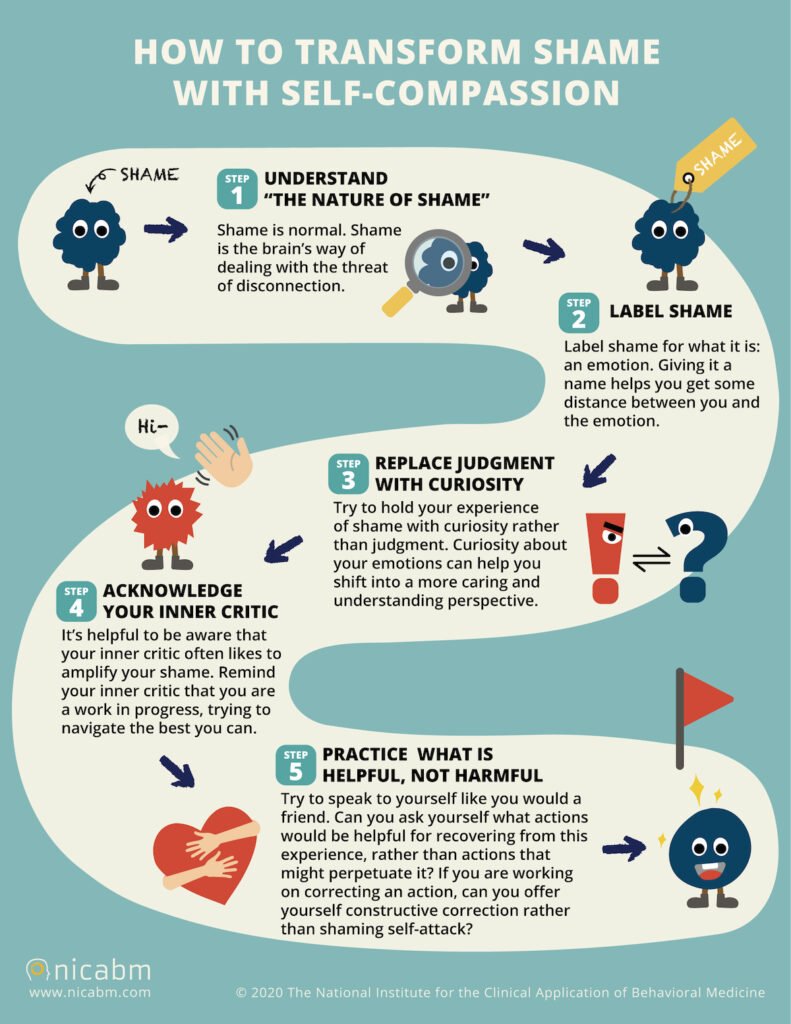Self-compassion for shame and motivation


This is not the to start with time I’ve published about self-compassion. It also won’t be the past, due to the fact self-compassion is that crucial, such as for shame and determination. I have finished trainings in self compassion because I want my perfectionist self to be far more self-compassionate and help my perfectionist shoppers cultivate a lot more self-compassion, way too.
What is self-compassion? On the most straightforward stage, it’s turning compassion inwards when you make a error, fall short at anything, or are battling — instead than currently being self-essential. On a additional in-depth stage, self-compassion has 3 components:
- Self-Kindness
- Widespread Humanity
- Mindfulness
When we’ve just screwed up, stuck our foot in our mouth, or are hurting due to the fact of anything somebody reported to us, we ought to have kindness, simply because we are human, and all individuals screw up, say the completely wrong factor, and put up with in some cases. Mindfulness allows us be conscious of what we’re doing and sensation, and of how we can give ourselves consolation.
What self-compassion is not is self-pity, laziness or indulgence. Demonstrating your self kindness is not the similar as throwing on your own a pity celebration, nor is kindness a luxury afforded to a choose handful of. And self-compassion does not enable you off the hook if you owe another person a heartfelt apology or built a slip-up that you need to resolve.
Self-compassion is not egocentric, and it’s not just about ourselves. We are all interconnected, so displaying ourselves compassion impacts absolutely everyone we occur into make contact with with. If we never ever present ourselves compassion, we’ll run out of compassion to give to others. I locate this ironic, simply because some of the kindest, most compassionate individuals I know have issues turning that kindness and compassion to themselves.
Linked Publish: Want to be much healthier in 2023? Fireplace your interior drill sergeant.
Self-compassion is the antidote for shame
Most things have a polar opposite, and that is true for self-compassion. The opposite of self-kindness is self-criticism, the opposite of popular humanity is self-isolation, and the opposite of mindfulness is self-absorption. Individuals reverse qualities of self-compassion — self-criticism, self-isolation, self-absorption — just take place to be qualities of shame.
In reality, shame and self-compassion usually coexist in inverse proportions. The additional self-compassion you display by yourself, the much less shame you working experience, and vice versa.
Shame can feel isolating — as if you’re the only 1 who’s expert it — but it is a universal emotion. It’s also not a permanent emotion, even although after you are slipping into a disgrace spiral it may possibly sense like you’ll in no way get out. As with all feelings, shame is transitory.
Shame is commonly an harmless emotion that calls for kindness mainly because it stems from the want to be liked. From birth, we have the require to be loved because when someone enjoys us, we will survive. We under no circumstances give up this wish/will need, even once we’re entire-fledged adults who can consider care of ourselves. Disgrace is the anxiety that a little something about us renders us unlovable. We all have the capability for disgrace, and it was fantastic for evolutionary reasons for the reason that it retained us in the team, which meant we did not have to go it by yourself when the sabertooth tiger arrived together.
When I took a instruction on Aware Self-Compassion from self-compassion researchers Kristen Neff and Christopher Germer final 12 months, Germer explained that if you consider a coin, disgrace is on one facet and the have to have to be loved on the other. If we can see the require to be beloved, it opens the door to compassion and calls for kindness. He talks a lot more about self-compassion is an antidote to disgrace in this video:
How do we know when we’re experience shame?
There are two styles of shame:
- Point out disgrace, which arrives and goes
- Trait disgrace, which we carry all over all the time
State disgrace is great, mainly because we can exhibit ourselves compassion, then get motion if the set off for the disgrace is a little something we did or reported. Trait shame is not excellent at all — we build it because we realized and internalized it dependent on how we have been taken care of by some others, and from messages we decide on up from modern society. Trait shame is not our fault.
(It is ironic that persons who Really should really feel shame since of something they did don’t feel it, while individuals who should not sense shame do, and it’s normally not simply because of some thing they did — they feel it because they’ve been devalued.)
Shame is a “self-conscious” emotion. Though guilt signifies, “I did a terrible point,” shame usually means, “I am a bad detail,” and then right here comes the self-important voice. Self-criticism is an assault on the self, and disgrace keeps us from residing up to our prospective. Shame is mostly invisible: it can make us go compact, go silent, or go absent. We come to be concerned to go into public due to the fact we don’t want individuals shameful features of ourself be revealed. And when we are in general public, we may perhaps not experience totally free to be ourselves. We aren’t dwelling totally.
In that training I described, Germer mentioned: “The extra we understand about disgrace, the a lot more it loses its grip,” and “Addressing with shame with self-compassion can be a transformative working experience.”
There’s an physical exercise named “self-compassion break for shame,” and fairly than create it out here, I endorse observing Germer lead the training in this movie.
This infographic from the Nationwide Institute for the Scientific Software of Behavioral Drugs (NICABM) on reworking shame with self-compassion basically potential customers nicely into how to use self-compassion to inspire ourselves. (If you want a printable edition, simply click on the connection.)

Self-compassion is an productive motivator (Part 1)
Keep in mind how I reported self-compassion isn’t laziness? Self-compassion can also be motivating in a way which is the opposite of the interior drill sergeant we usually subject matter ourselves to. To see how this is effective, grab a pen and paper, then:
- Publish down an unhelpful behavior you engage in which is producing you some unhappiness, and that you would like to modify. Try to decide 1 that is moderate-to-reasonable in conditions of difficulty. (For case in point, are you heading to mattress late each individual evening then locating it tough to get up in the early morning and get to perform on time? Are you not getting much motion in your working day and you’re noticing that you are experience stiff and just form of blah?)
- Compose down how your internal critic expresses alone when you do this conduct. What phrase and tone does it use? If no phrases are coming to you, is there an picture?
- Publish down how it feels to get this criticism, disapproval and judgement. How considerably distress has your interior prompted you? Now, generate a couple of phrases of kindness and compassion to the section of you that feels criticized.
- Get curious about your interior critic. Is there any way it could be attempting to help you, it’s possible by protecting you or trying to keep you harmless? If you occur up with some thing, and it feels Alright, try out crafting a few words and phrases of many thanks to your inner critic or a couple phrases of appreciation for its efforts to aid, it’s possible recognizing that its intentions were good even if its words and phrases finished up not supporting. If you never imagine your internal critic was actually making an attempt to assist (as is in some cases the scenario) then give your self some compassion for how your interior critic has built you put up with in the past.
Self-compassion is an powerful motivator (Portion 2)
Now that you have gotten curious about your crucial voice, and maybe gave it a “Thank you for your services, I can see you had been seeking to assistance, but I believe I require to come across distinct support,” can you locate your internal compassionate voice?
If this feels hard, try out imagining of the voice of a kind father or mother or a pricey pal who is smart, caring, and knowing, who accepts you unconditionally and wants the finest for you. This is your interior compassionate voice/component/self.
Consider putting your hands around your heart (or somewhere else that feels soothing) and come to feel their heat. Imagine about the conduct you’re seeking to transform. Repeat a phrase that reflects your interior compassionate voice. A few tips are:
- “I enjoy you and I never want you to endure.”
- “I really treatment about you, and I want to do what I can to assistance you make this improve.”
- “I’m always listed here for you to help you however you want.”
Then, when and if it feels Okay, produce a notice to yourself in the voice of your compassionate self about the change you want to make that captures the experience of becoming unconditionally beloved and supported. What do you have to have to hear in purchase to shift toward change?
There’s likely to be suffering in our life until eventually the working day we die, and some of this is due to the fact we make issues or have hassle modifying patterns. You could consider to offer with this suffering by launching into what is been named “the subtle aggression of self-enhancement.” Or you could clearly show by yourself kindness. Studying to take and even embrace your imperfections is a massive change in intention. In the words and phrases ofpsychotherapist Carl Rogers:
“The curious paradox is that when I accept myself just as I am, then I can transform.”

Self-compassion is not a solution for all ills (but it allows)
We all have earned kindness and compassion from other individuals. Self-compassion doesn’t make up for poor treatment method from many others — or for deeper injustices — but it is a way to give ourselves kindness any time we want it, at the minute we have to have it.
If working towards psychological self-compassion does not feel safe and sound for you, possibly because of your upbringing, behavioral self-compassion may well nonetheless come to feel safe. Behavioral self-compassion in day-to-day lifetime is doing the points you typically do to treatment for you. For instance, consuming a cup of tea or espresso, heading for a stroll in the woods, gardening on a wonderful spring day, reading through a superior book, taking a shower or bath and delighting in the sense of the h2o on your skin, heading to bed on time.
There are also somatic expressions of self-compassion. For the three areas of self-compassion, these search like:
- Mindfulness: Hold out your hands, palms up
- Prevalent Humanity: Hug yourself
- Self-kindness: Position your hands on your heart
Searching precisely at somatic expressions of self-kindness, there are a lot of ways we can exhibit ourselves compassion by way of self-touch:
- Palms jointly (prayer place)
- Hand on coronary heart
- Two overlapping hands on coronary heart
- Fist on coronary heart, protected by other hand (toughness + tenderness)
- Hand on cheek
- Leaning cheek into hand
- Both of those arms cupping confront
- Palms cupping head
- A person hand on coronary heart, other hand on belly
- Fingers touching arms or legs
- Fingers nestled (palm up) in lap

My go-to resources
If soon after studying the part previously mentioned you are rolling your eyes (which I did, also, after upon a time), I really encourage you to just attempt it. A lot of of my shoppers have uncovered these tangible expressions of self-kindness to be incredibly useful, and as an extra bonus, you can do them rather a great deal anyplace, and even preserve them solution.
(In this episode of the 10 % Happier podcast on “The Scientific Circumstance for Self-Compassion,” Germer and host Dan Harris deal with how self-compassion can often sense “cheesy.”)
A person shopper observed that self-compassionate touch assisted when she was in a stress filled conference at do the job. (You know…those conferences the place you are pondering, “I cannot think I have to operate with some of these individuals.”) Placing her fingers on her legs underneath the table in a kind gesture aided her get by way of. Other customers have felt calmed by inserting a hand about their coronary heart while they’re stopped in site visitors gridlock. (That is a fantastic time to apply acceptance of the latest moment, for the reason that very little you do will make site visitors go quicker.)
To discover additional about self-compassion, right here are my favorite methods:
This write-up has Amazon Affiliate inbound links. As an Amazon Associate I get paid from qualifying buys.
Carrie Dennett, MPH, RDN, is a Pacific Northwest-centered registered dietitian nutritionist, freelance writer, intuitive eating counselor, author, and speaker. Her superpowers involve busting diet myths and empowering women to feel better in their bodies and make food items possibilities that assistance pleasure, nourishment and wellness. This put up is for informational uses only and does not represent individualized diet or professional medical information.
Looking for 1-on-1 diet counseling? Carrie features a 6-month Foodstuff & Body system (intuitive feeding on, overall body graphic, mindfulness, self-compassion) and a 4-thirty day period IBS administration system (very low-FODMAP food plan coaching with an emphasis on rising foodstuff liberty). Stop by the one-way links to learn a lot more and reserve a cost-free intro connect with to see if the system is a very good healthy, and if we’re a fantastic fit!
 Print This Post
Print This Post





